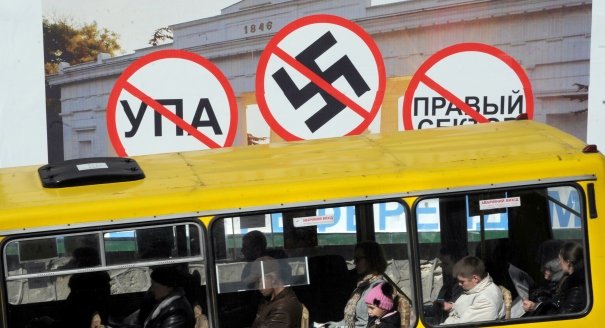Thomas de Waal
{
"authors": [
"Thomas de Waal"
],
"type": "commentary",
"centerAffiliationAll": "",
"centers": [
"Carnegie Endowment for International Peace",
"Carnegie Europe",
"Carnegie Russia Eurasia Center"
],
"collections": [],
"englishNewsletterAll": "",
"nonEnglishNewsletterAll": "",
"primaryCenter": "Carnegie Europe",
"programAffiliation": "",
"programs": [],
"projects": [],
"regions": [
"Russia",
"Eastern Europe",
"Ukraine",
"Western Europe"
],
"topics": [
"Political Reform",
"Foreign Policy"
]
}
Source: Getty
Anti-Fascism and Its Discontents
The message in Moscow is that Ukraine has been taken over by “Fascists” and neo-Nazis: if the enemies are Fascists, then all means for combatting them are acceptable.
Russia has a new, old ideology: anti-Fascism.
For several months now the relentless message in Moscow has been that Ukraine has been taken over by “Fascists” and neo-Nazis. This message has saved the Russian public from having to confront the idea that their country has gone to war with Ukrainians: if the enemies are Fascists, then all means for combatting them are acceptable.
Anti-Fascism had a previous incarnation in Soviet times, when its main target audience was the European left. In the 1930s, as it dismissed reports of political repression or famine in Ukraine as right-wing propaganda, Stalin’s government called on European socialist parties to rally round the Soviet Union in the common fight against Fascism.
The “anti-Fascist” narrative is easy to pick apart. Both the right-wing Svoboda party and the even more extreme Right Sector played a key role in the fall of Viktor Yanukovych in February. Svoboda then won positions in the interim government. But that seems to have been their high-water mark. Svoboda’s leader Oleh Tyahnybok and Dmitry Yarosh of Right Sector now look likely to collect only around one per cent of the vote each in next Sunday’s elections.
Moreover, as many have pointed out, the biggest support for Vladimir Putin in Europe currently comes from the far-right, from parties such as Marine Le Pen’s National Front in France or the anti-Semitic Jobbik party in Hungary.
But anti-Fascism is bigger than Ukraine—or even Vladimir Putin.
The domestic appeal of the idea in Russia is that it can embrace the heroic parts of the Soviet legacy without the socialist economics. Its foundational story is victory over Nazism in the Second World War in 1945. As my colleague Maria Lipman of Carnegie Moscow Center has observed, Russia’s victory celebrations of May 9 “grow ever larger as the war itself moves deeper into history” and they feed the resurgence of a cult of Stalin in Russia.
The victory of 1945 was absolutely real and achieved with some of the greatest suffering in history. Where it becomes mythical rather than real, as Timothy Snyder has noted, is through the notion that that the victory was by a Russian army, rather than a multi-national Soviet Red Army. History records that Ukrainians died in even greater numbers per capita than Russians did in the fight against Hitler.
So if, as expected, Ukraine’s presidential election turns out to be a victory for the old oligarchs over both the far-right and the Maidan civic activists, then Russian anti-Fascism will be still here to stay. It will, however, require a new threat to justify the vigilance of the Russian people.
About the Author

Senior Fellow, Carnegie Europe
De Waal is a senior fellow at Carnegie Europe, specializing in Eastern Europe and the Caucasus.
- Europolis, Where Europe EndsCommentary
- Taking the Pulse: Is It Time for Europe to Reengage With Belarus?Commentary
Thomas de Waal, ed.
Recent Work
Carnegie does not take institutional positions on public policy issues; the views represented herein are those of the author(s) and do not necessarily reflect the views of Carnegie, its staff, or its trustees.
More Work from Carnegie Endowment for International Peace
- Europe on Iran: Gone with the WindCommentary
Europe’s reaction to the war in Iran has been disunited and meek, a far cry from its previously leading role in diplomacy with Tehran. To avoid being condemned to the sidelines while escalation continues, Brussels needs to stand up for international law.
Pierre Vimont
- What We Know About Drone Use in the Iran WarCommentary
Two experts discuss how drone technology is shaping yet another conflict and what the United States can learn from Ukraine.
Steve Feldstein, Dara Massicot
- How Far Can Russian Arms Help Iran?Commentary
Arms supplies from Russia to Iran will not only continue, but could grow significantly if Russia gets the opportunity.
Nikita Smagin
- Is a Conflict-Ending Solution Even Possible in Ukraine?Commentary
On the fourth anniversary of Russia’s full-scale invasion, Carnegie experts discuss the war’s impacts and what might come next.
- +1
Eric Ciaramella, Aaron David Miller, Alexandra Prokopenko, …
- The Kremlin Is Destroying Its Own System of Coerced VotingCommentary
The use of technology to mobilize Russians to vote—a system tied to the relative material well-being of the electorate, its high dependence on the state, and a far-reaching system of digital control—is breaking down.
Andrey Pertsev












